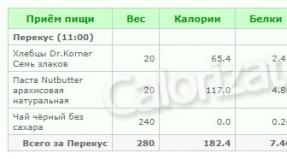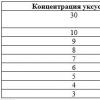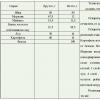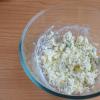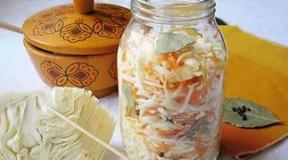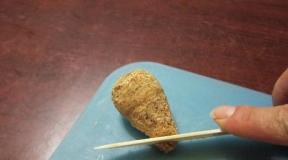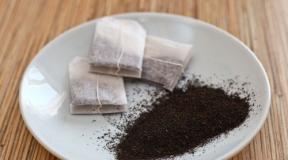How is sesame useful for humans? Interesting facts about sesame seeds and their main health benefits.
Sesame (from lat. Sesamum - oil plant) - one- and perennial plant, in the pods of which sesame seeds ripen. There are several types of sesame seeds: white, yellow, brown and black. But most often there are two main types: white and black. White ones are used in cooking for heat-treated dishes, and black ones - vice versa. It is this species that is more aromatic.
Humanity began to use sesame seeds a very long time ago. It was used for medicinal purposes in ancient Greece, Rome, Babylon and China. Sesame oil is mentioned in the ancient cultural heritage of many countries, as well as in the Holy Scriptures. The first to describe the maximum number of useful properties of sesame and sesame oil was Avicenn, who created a huge work on healing in the 11th century.
Now sesame seeds are grown for export in Transcaucasia, Central Asia, the Far East and India.
Selection and storage
When buying sesame seeds, you need to choose those that do not stick together and are as dry as possible.
The most beneficial are raw sesame seeds because during heat treatment, the bulk of the nutrients evaporate. However, raw seeds should not be stored for a long time. Within 1-2 months they begin to turn rancid. Cold-pressed sesame oil can be stored for the longest time. It retains its beneficial properties for 9 years without significant changes in the vitamin, mineral and chemical composition. The oil tastes like olive oil, but is more aromatic and lacks the bitterness inherent in olive oil. You cannot fry in sesame oil, because it immediately begins to burn and at high temperatures carcinogenic substances begin to form in it. It is used exclusively for dressing vegetable, meat and cheese salads. Sesame oil is also used for cosmetic purposes for massage, make-up removal and as a base for moisturizers.
Use and application
Sesame seeds are used in cooking for the preparation of kazinaks, candies, halva and other sweets, in bakery products and as a seasoning for meat.
Calorie content of sesame
Sesame has a high calorie content due to its high fat and protein content. 100 g of sesame seeds - 560 kcal. And in 100 g of sesame oil - 884 kcal. This product causes obesity, so it is important for overweight people, as well as those who follow their figure, to use it with caution.
Nutritional value per 100 grams:
Useful properties of sesame
Composition and presence of nutrients
Sesame seeds are classified as oil products. They contain almost 60% of the seed volume of vegetable fats, including linoleic, oleic, palmitic, myristic, arachidic, stearic and lignoceric acids. These substances are indispensable for the human body and take part in all vital processes. Also sesame seeds have a rich vitamin and mineral composition. It contains vitamins,, and B groups; minerals - magnesium, zinc, phosphorus, iron, but most of all in calcium. For 100 g of sesame, it accounts for as much as 783 mg, which is the daily dose of an adult. In addition, the seeds contain organic acids: beta-sitosterol, phytin and lecithin.
Useful and medicinal properties
Sesame oil should not be used with aspirin and oxalic acid, since, when combined with them, calcium forms deposits in the kidneys.
There are known cases of individual intolerance to sesame seeds.
"Sim-sim, open up!" - such a simple incantation is uttered by the hero of the Arabian fairy tale "Ali Baba and the Forty Thieves" in order to open the entrance to the cave with untold riches. In Western translations, this phrase is better known as "Open Sesame." But did you know that sesame - Sesamun indicum - is the scientific name for sesame seeds? It is believed that the use of the name of these particular seeds is not accidental: their peculiarity lies in the fact that during ripening the sesame seeds burst, emitting a crackle, very similar to the sound of opening the door to a cave.
In general, sesame has been used as a dietary supplement by humans for thousands of years. And this is not surprising! Sesame seeds are the champions: the calcium content in sesame is higher than in cheese. But this is an important trace element, without which the functioning of the human body is impossible. Let's find out what the benefits and harms of sesame seeds are, how to take it in order to get the most out of it.
Let's start by defining what this unique plant actually is.
What is sesame seeds?

It is an annual or perennial tropical plant, the healing properties of the seeds of which have been known to people for over 3500 years. By cultivating sesame seeds and studying its properties, our distant ancestors managed to obtain not only a source of useful oil, but also a healing remedy for a number of diseases.
Despite the fact that sesame is a herbaceous plant, outwardly it looks like a small bush with pods. These fruits, when ripe, burst, emitting a characteristic crackle and throwing out flat seeds. The seeds themselves, despite their small size (100 g contains at least 500 pieces), are valued for their high nutritional properties.

Depending on the variety, sesame seeds of different colors are found: black, white, yellow and even red. It should be noted that each species has its own unique taste and contains a different amount of useful trace elements. For this reason, it is very difficult to give a definite answer to the question of which of the varieties is the most useful. We only note that the most valuable are black seeds that have not gone through the process of peeling.
Homeland of sesame seed
Sesame seeds have been cultivated in tropical regions around the world since prehistoric times, but in the cultures of some peoples myths are still alive, according to which the origin of the plant has even deeper roots. According to one of the Assyrian legends, when the ancient gods met and decided to create our world, they drank wine from sesame seeds.
The first mentions of the use of sesame seeds by humans are found in early Hindu legends, therefore, traditionally, it is India that is considered the birthplace of this miraculous plant. From India, sesame seeds gradually spread throughout the Middle East, Africa and Asia. Today it has become an indispensable ingredient for making oils and all kinds of seasonings. Metaphorically, he is called "the emperor of the grains of the East and the king of oils of the West."
The largest producers of sesame seeds today are India, China and Mexico.
What is sesame seed good for?

Sesame seeds are half fat. The remainder is about 30% vegetable protein. Despite the fact that this combination has obvious benefits, it is very high in calories - 100 g of sesame contains 560 kcal. Therefore, you should not abuse it - it is enough to eat 1.5 tbsp per day. l. to get the most out of your health benefits. In this case, the intake of seeds should be carried out in the morning or afternoon. Those who have problems with excess weight should pay special attention to this fact.
Sesame is a real storehouse of vitamins. It contains 10 nutrients that must be present in the diet for healthy body function and well-being. The table shows how many percent of these substances from the average daily intake are contained in a serving (35 g) of sesame seeds. The effect of some of them on the body is also described below.
In addition to these substances, sesame contains sesamin and sesamoline. These two absolutely unique antioxidants are the best known lignans and have a variety of functions in the body. They have anti-inflammatory and fat-burning properties, trigger metabolic processes and participate in the absorption of vitamin E.
Copper
This vital trace element, which is involved in the formation of hemoglobin and red blood cells, ensures the metabolism of iron in the body, increases the absorption of proteins and carbohydrates, and also has anti-inflammatory properties. Thus, copper can significantly improve the condition of a person suffering from an autoimmune disease (in particular, rheumatoid arthritis).
Magnesium
Magnesium is essential for the proper functioning of the heart and the transmission of nerve impulses. It provides the exchange of protein and nucleic acids, is involved in the process of extracting energy from food. In addition, it helps to normalize sleep and restore the nervous system.
Zinc
Zinc is essential for the organization of normal processes of bone tissue development, cell regeneration and reproduction. It supports the reproductive function of the body, participates in the growth of hair and nails, and also reduces the harmful effects of toxic substances.
Calcium. How much calcium is in sesame seeds?

Numerous studies have confirmed the positive properties that calcium has on the human body. Since ancient times, people have known about them and have used sesame seeds as a source of calcium. What properties are we talking about?
- Protecting the walls of the colon from harmful chemicals that cause cancer.
- Normalization of the acidity level of the blood due to the alkali-forming effect.
- Strengthening bone tissue and preventing brittle bones that can result from menopause and arthritis.
- Prevention of the development of diseases caused by a lack of calcium in the body, such as osteoporosis.
- Preventing headaches and relieving migraines in people who are prone to it.
- Reduction of PMS symptoms during the menstrual cycle, especially the luteal phase.
Calcium is found in sesame seeds in sufficient quantity. Unfortunately, this fact itself does not at all guarantee that all of it will be fully received by the body during use. The question arises, in what form will it be more correct to eat sesame seeds so that the calcium contained in it is absorbed?
As a rule, in various grocery chains they offer to purchase peeled white sesame seeds. But it is known that, in comparison with whole seeds, such sesame contains 10-12 times less calcium. This provision causes some controversy among nutritionists. Nevertheless, when answering the question of which sesame contains more calcium, it is worth giving preference to dry friable seeds, in which this useful mineral is contained in the maximum amount.
You can also highlight a number of simple rules for the proper storage and use of seeds. Try to follow them to keep the calcium in sesame seeds:
- shelf life of sesame seeds - no more than 6 months;
- the product should be kept in a closed container, protected from direct sunlight;
- during cooking, do not subject the seeds to prolonged heat treatment;
- if the seeds are planned to be used for cooking, it is very important to follow all the necessary recommendations and to withstand the soaking period.
Remember that for the absorption of calcium, it is necessary that the body receives a sufficient amount of vitamin D. It is impossible to provide this only through nutrition, so it is worth leaving the house more often in clear weather and walking.
Why is the use of sesame seeds harmful?
Even the most healthy foods must be consumed in strict accordance with the characteristics of your body. Sesame is not recommended for asthmatics and people with individual intolerance to sesame. Like many nuts, seeds can cause allergy-like symptoms, from a runny nose and mild redness of the eyes to Quincke's edema and anaphylactic shock.
If the product is regularly abused, dangerous diseases such as colitis, chronic diarrhea, and bowel cancer can develop. A single excess of the consumption rate leads to stool disorders and can cause appendicitis.
Black and white sesame seeds: what's the difference?

The choice of a particular sesame variety depends on the purpose for which it will be used. White sesame seeds are commonly used to prepare various baked goods. After removing the husk, they acquire a softer structure and a sweetish taste. Black sesame, on the other hand, crunches on your teeth and has a bright nutty flavor. The nutritional value of both varieties is about the same, but black seeds contain more calcium, zinc, vitamin B and other minerals.

Thus, you have found out the benefits, harms and how to take sesame seeds and now you know how to use it correctly so as not to harm your health.
The ancient Assyrians believed that before starting the creation of the world, the gods drank precisely the nectar from sesame seeds. And there is something in this: small seeds are able to restore strength and health. But first things first.
Description
Otherwise, sesame is called the magic word sesame. It belongs to the clear-colored, pedal family. The name sesame itself has Semitic roots, but it came to us through Greek. One way or another, but in Greek, and in Assyrian, and in Arabic, this word is translated as an oil plant.
Sesame can be of several varieties and colors. Most species can be found exclusively in Africa, but a species such as Sesamum indicum grows in all subtropical countries and is a cultivated plant. And when it comes to sesame as a food product, it is usually Indian sesame that is meant. By the way, depending on the variety, these seeds can be not only white or black, but also yellow, red, brown.
Most of their useful properties (we will talk about them later), these seeds lose when treated with heat, but the oil from them (produced using cold pressing) can retain all its properties for about nine years. It tastes like olive, but not so bitter, and benefits in no way inferior to pistachio or almond, and it costs less. True, this oil cannot be used for frying: it burns and becomes harmful.
By the way, this plant is very fragile and capricious. So, the air temperature for its full growth should be about 30 degrees, and the earth should warm up to 16. Even if these indicators fall by half a degree, the plant may die. The soil for sesame seeds must be thoroughly fertilized and free of weeds. Yes, and you need to harvest very carefully: the pods with seeds are very fragile. However, agronomists believe that sesame is one of the oldest cultivated plants. Sesame seeds and oil from it are an indispensable element in Arab cuisine, and Central Asian, and Israeli, and Indian, and Japanese, and Chinese, and Korean.
By the way, in cooking, it is used not only for sprinkling muffins or as a seasoning. So, it is from it that tahini white halva is made, and this is one of the richest sources of calcium in the world. And these are not all the beneficial properties of small seeds.
Collection and procurement
 The sesame seeds themselves are not stored very long. In order to somehow prolong their freshness, sesame is often fried. But during this process, many useful properties of the product are lost. That is why it is more expedient to use oil from these seeds in cooking, in medicine, and in cosmetology.
The sesame seeds themselves are not stored very long. In order to somehow prolong their freshness, sesame is often fried. But during this process, many useful properties of the product are lost. That is why it is more expedient to use oil from these seeds in cooking, in medicine, and in cosmetology.
In addition, they must be properly selected and stored. Be sure to taste sesame before buying: it should not taste bitter. "Correct" seeds should be crumbly.
It is best to choose unpeeled seeds. They are best stored in the refrigerator, and if you freeze them, they will last a year. Seeds that are not frozen or peeled can be stored in a dry place for about three months, and in the refrigerator for about six months. Peeled seeds are stored for about three months. Peeled or not, don't forget to put them in a container. Oil can be stored for many years - this is also possible thanks to antioxidants that allow it to stay fresh for an infinitely long time. Ground sesame seeds (flour) can be stored for a maximum of a week.
Chemical composition
First, let's figure out the chemical composition.
100 g of seeds contain 560 kcal. This is a lot, but not so much for an oilseed crop. The seeds also contain 19.5 g of protein (also a lot) and 49 g of fat. But most of the fatty acids in its composition are useful and polyunsaturated, that is, they are good antioxidants.
As for vitamins and other antioxidants, there is a lot of vitamin E (the best anti-aging remedy), vitamin A, as well as vitamins from the B group.
But the main element that makes sesame seeds valuable is calcium. It is 1470 mg, which is only 30 mg less than the daily dose of calcium needed by people for the health of bones, teeth, hair, nails. All this calcium is organic, so it is absorbed perfectly. So, after injuries or with osteoporosis, eat sesame seeds and do not deny yourself these small seeds. Do not forget that we need this element to alkalize the blood, which means the prevention of cancer and to improve immunity.
There are many other elements here. So, in the same 100 g, there is an almost daily rate of iron, without which blood health is impossible.
But in both cases we are talking about unpeeled and raw sesame, which is not easy to find in our latitudes. In this case, oil can again be a compromise.
There is also a lot of potassium (almost 500 mg), magnesium (530 mg), more than 700 mg of phosphorus and 75 mg of sodium.
Among the nutrients that do not belong to micro and macro elements, lime is worth noting. There is enough of it in 100 g of seeds to satisfy our need for it for a day. We need a small amount of lime to normalize mineral metabolism in the body.
Calcium, iron and other elements that are in these seeds are perfectly absorbed due to the fact that sesame also contains phytic acid and oxalates.
There are also unique components here. These include lignans sesamolin and sesamin, which are excellent antioxidants that slow down aging, prevent fatty degeneration of the liver and improve lipid metabolism in the body. In addition, these lignans enhance the work of vitamin E, prolonging its antioxidant effect. All this endowed sesame (and the oil from it) with a lot of useful properties.
There is also thiamine, which not only brings the metabolism in order, but also the nervous system. Thanks to vitamin PP, digestion is also improved. But vitamin B2, aka riboflavin, is needed most of all by children, because it stimulates the growth and proper development of all internal organs, as well as their systems.
Useful properties of sesame
First of all, sesame seeds cleanse the body of any toxins, including in the liver and bile, and also help to become slimmer (if not abused: after all, an oilseed crop). In addition, this product improves blood clotting, so it is needed in the diet of people with hemorrhagic diathesis.
Sesame, as a source of calcium, strengthens both gums and teeth, in addition, it prevents diseases of the oral cavity. No, the visit to the dentist is not canceled, but prevention can be like that.
This product is very good for building muscle mass, because the protein in it is easily absorbed, and due to its plant origin, during this process, the body does not lose minerals, including calcium. So, sesame also minimizes the risk of injury while playing sports and bodybuilding.
Sesame can be a substitute for dairy products if you have an intolerance, and a substitute for meat if you are a vegetarian.
Despite the high amount of fat, sesame seeds do an excellent job with excess cholesterol. It not only removes the excess, but also gets rid of the cholesterol plaques that you have already acquired. Thus, magic seeds will allow you to live without atherosclerosis and hypertension. By the way, such a "powder" neutralizes the harm from baking and other unhealthy pastries: it's not only about getting rid of cholesterol, but also because there are so many plant fibers in sesame seeds that an extra bun with it will not harm either the waist or the stomach.
because of a large number antioxidants sesame can be called the elixir of youth, but the same substances actively fight against cancer cells, preventing their occurrence and destroying those that have barely appeared.
Oil from these seeds saves from constipation no worse than ricin or even linseed oil, besides, it is useful for gastritis and many other ailments of the intestines and stomach. However, there are many other problems that both sesame seeds and its oil can help. You can use it when:
- diseases of the joints;
- dry cough;
- asthma;
- diseases of blood vessels and in general of the cardiovascular system;
- ailments of the pancreas, liver and bile;
- kidney ailments;
- bronchitis;
- problems with the thyroid gland;
- helminthiasis;
- increased acidity of blood and gastric juice.
The product improves metabolism and rejuvenates. Since there are a lot of phytoestrogens (analogs of female hormones), this oil and its seeds put the reproductive system in order in women, treats “female” diseases and, in total, helps to get pregnant. For older ladies, this product will allow them to survive menopause without any particular difficulties and even slow down its onset: it is not without reason that this is the elixir of youth. And during pregnancy, it will be very useful, especially if consumed in moderation: there is still a lot of calcium, which will help with the formation of the baby's skeleton and minimize the loss of this element in the mother. In addition, this product prevents mastopathy and breast inflammation when feeding a baby or infections.
Interestingly, sesame and its oil are good even if you just add them to your cooking experiments. But traditional medicine offers its own ways to get rid of any ailments with the help of these seeds.
Sesame oil is also widely used in dermatology. Ointments, emulsions, and plasters are made from it, which treat various skin ailments.
Folk recipes and methods of application
Youth elixir
 First of all, let's talk about the sesame elixir of youth. To prepare it, we will need the following ingredients:
First of all, let's talk about the sesame elixir of youth. To prepare it, we will need the following ingredients:
- ground ginger (5g);
- sesame seeds (the same amount);
- powdered sugar (the same amount).
Stir and take a teaspoon in the morning.
For colds and lung diseases
You can take both oil and seeds, and both external use and ingestion will be beneficial.
You can use it externally like this: just heat it up in a water bath (temperature 36-39 degrees). We rub it into the chest in the evening, be sure to warm it, put the patient on his stomach and cover with warm blankets. Inside, oil or seeds are used from once a day and up to three times, and from half a teaspoon to a whole one.
If your child (or you) has pharyngitis or sore throat, you can add oil (5-6 drops) to warm milk. Drink twice or thrice a day. If desired, honey can be added to the same milk. If you develop otitis media, you can put the oil in a couple of drops in the affected ears.
If immunity is lowered with a cold, sesame seed powder can also be used. Dry and grind them in a coffee grinder. We eat once every 8-12 hours, one teaspoon, washed down with ginger tea. The same remedy will be effective for joint or muscle pain, as well as for recovery from any disease, when immunity tends to zero.
For teeth and gums
Sesame seeds and sesame oil will help keep your teeth and gums strong. Firstly, they need calcium, and even easily digestible, of which there is a lot. So, eat and do not deny yourself this pleasure. Even tahini halva or sesame kozinaki will be useful, despite the fact that they are sweets.
The oil can be rubbed into the gums for a massage. This will not only nourish them with calcium and vitamins, but also improve blood circulation, like any massage. A good remedy for periodontal disease.
You can also rinse their mouth. Take a tablespoon of oil in your mouth and keep it for a couple of minutes. Then we rinse for a couple of minutes. The procedure is done every day.
To combat gastrointestinal diseases
Sesame seeds and sesame oil will also be appropriate. For gastritis, ulcers, and constipation, oil is best. You need to drink it in quantities from a teaspoon to a tablespoon. Take three times a day. The oil temperature should be at room temperature.
For diarrhea, seeds will be more effective. Boil them and mix with honey, preferably floral. In case of diarrhea or poisoning, you can not even cook them, but simply grind them, dilute them with a little boiled water and add a little honey. Eat a little once an hour.
If you want to lose a little weight and remove toxins from the intestines, grind the seeds (a teaspoon) in a coffee grinder and eat three times a day before each meal. Remember to drink plenty of water afterwards. In addition, you can lose weight with sesame due to the fact that a small pinch of grains satisfies hunger, if you mix it with not big amount honey.
Hemorrhoids can also be attributed to diseases of the gastrointestinal tract and sesame copes well with this ailment. You can drink the oil internally, or you can use an external remedy. To prepare it, we need sesame itself (a couple of teaspoons) and half a glass of boiling water. Fill in the seeds and cover with a lid. We insist 30 minutes, filter. Lubricate the anus with cooled infusion several times a day.
Sesame is an aphrodisiac
Did you know that sesame seeds are a great aphrodisiac. For a great aphrodisiac, mix sesame seeds with the same amount of poppy seeds and flax seeds. We eat a teaspoon or add to the dishes for a loved one: such a remedy also works for men.
For mastitis, sesame seeds are best used externally. Dry and grind the seeds in a familiar coffee grinder. Fill with vegetable oil and use as a compress for the mammary glands.
For the treatment of female diseases, we also use oil inside (a tablespoon three times a day), or we chew seeds. It also has a good effect on men's health.
Sesame milk
Fortifying and vitamin sesame milk, which not only tastes like real milk, but also supplies calcium, is prepared from the following products: 100 g of fresh (not fried and unrefined) sesame, a liter of boiled water and honey (a couple of tablespoons). Pour the seeds into a bowl and fill with water for 2 hours. Now we drain the water and rinse a little sesame. Now fill again with water (100 ml) and add honey (all). Mix with a blender and pour in all the remaining water. It remains to strain the milk. It is better not to throw away the cake: it can be used in further culinary experiments. This milk will be useful for anemia, pancreatitis, problems with the thyroid gland, and simply with low immunity or fatigue.
For insomnia
If you have insomnia, try lubricating your feet with sesame oil. Its pleasant scent also soothes, and the legs relax.
For skin health
This product is also used in dermatology, but only in the form of an oil. They can lubricate all cracks, wounds, skin injuries. It fights dermatitis and other skin problems, relieves pain from burns. May have an unexpected but pleasant effect on eczema and psoriasis.
Sprouted Bone Seeds
Most of all calcium and other substances you get if you germinate sesame. Rinse the seeds (unpeeled and not roasted, of course) with cold water and place in a flat bowl. Cover the top with gauze and fill with some water (room water) so that it barely covers the sesame seeds. We leave it warm for a couple of days and all this time we make sure that the water does not evaporate and the gauze does not dry out. Rinse the seeds thoroughly before consuming them. This remedy is effective for osteoporosis, after fractures, caries and any other problem caused by a lack of calcium. We eat 50-100 g of seedlings per day.
Sesame seeds in other areas
Besides medicine and cooking, there is another area where sesame oil would be appropriate. This is cosmetology. This also includes hair care.
 Massage oil
Massage oil
First of all, it can be used as a base oil for massage. Firstly, it has a light texture and excellent penetrating ability, so it absorbs well, and it will be easier to rinse off the residue. Secondly, along with such a massage, the skin will receive a lot of vitamins and all the same calcium. And finally, it has a pleasant aroma, but it costs less than the same almond. Simply add aromatic oils to a light base and treat cellulite, stretch marks, laxity or sore joints.
Face care
It is also not bad for facial skin, especially aging, dry or weakly toned. It has excellent moisturizing and nourishing properties, and is also rich in magnesium, which makes it able to fight stress: apply it at night and in the morning your face will look fresh, even mimic wrinkles will become less noticeable. It also contains natural UV filters, so it can be used instead of sunscreens. It also perfectly smooths the skin of the face if it has pimple marks or other scars. You can also use it instead of make-up removers incl. from the eyes.
Baby skin care
The next area of \u200b\u200bapplication of the oil in cosmetology is the care of children's skin and skin that is too sensitive. It copes with redness and irritation and itching. If the skin is thin, sesame oil will strengthen it and prevent damage.
Skin around the eyes
Sesame oil moisturizes and strengthens it. In addition, it relieves both mimic wrinkles and wrinkles under the eyes. It is unlikely to be able to radically remove them, but it can completely reduce, refresh the fragile skin of the eyelids and nourish it. It will also help to cope with slight swelling and bruising under the eyes. Just do not apply it all night: the texture is light, but it can still get into the eye and make it red.
Hair care
Sesame oil can be added to masks or used separately. You can try mixing with other oils (with the same almond and coconut oils), or just apply a little to the ends of your hair after shampooing. Due to its lightness, it rinses off much more easily than other oils. You can also try applying it on eyebrows and eyelashes (in this case, mix it with aloe juice).
Harm, contraindications
This product is extremely useful, but it should not be overused in some cases. So, too many of these seeds or oils will not benefit those who are losing weight: after all, fats and calories are present here in rather large quantities.
Sesame is contraindicated in large quantities for pregnant women: a lot of phytoestrogens consumed at one time are quite capable of provoking a miscarriage. Also, sesame promotes the outflow of menstrual blood.
Sesame seeds also promote active blood clotting, which is not always good. The product is contraindicated for those who have thrombosis and a tendency to thrombosis, or simply people with good blood clotting. Another contraindication can be called urolithiasis. Well, do not forget that the daily rate of this product is three to four teaspoons.
Many people perceive sesame seeds only as a powder for buns. In fact, it is an excellent source of calcium and a real elixir of youth. This is especially true of unpeeled sesame.
The healing properties of sesame seeds have been known since ancient times. Our grandmothers were also happy to add them to food to give the dish a special piquant aroma. Sesame seeds, the benefits of which have long been proven, were added to baked goods, sprinkled with them on bread and holiday cakes. This spice was also used in the framework of alternative medicine. Decoctions from the seeds of this plant served as a source of useful micro- and macroelements and were used for a number of diseases.
The benefits of sesame seeds
Sesame seeds, the properties of which have long been heard by everyone, have a number of useful and even healing qualities. One has only to pay attention to the composition of the substances it contains. So, for example, calcium contained in sesame seed in large quantities can prevent the development of atherosclerosis, osteoporosis and spinal chondrosis. Calcium is an essential trace element necessary for the proper functioning of the cardiovascular system, strengthening bone and cartilage tissues, gaining muscle mass, etc.
Among the beneficial properties of sesame seeds:
- normalization of the functions of the nervous and digestive systems;
- acceleration of metabolic processes;
- purification and enrichment of the blood composition with the necessary substances;
- strengthening nails and hair, etc.
Sesame in medicine
And the contraindications of which are far from being fully studied, is also used in traditional medicine. Its seed extract is found in many weight loss products. He has a unique ability - to remove harmful cholesterol from the blood. It is known that sesame is especially useful for women over forty years old. The explanation is very simple. The plant's seed contains natural phytoestrogens necessary for the female body at a given time.
Sesame oil

Often used in the pharmaceutical industry. On its basis, emulsions and ointments are produced that normalize metabolic processes in tissues, which have a certain effect on the process of coagulation of blood cells, etc.
With the help of formulations prepared on the basis of oil, hemorrhoids are successfully cured. It is recommended to take orally for constipation and disorders of the digestive system.
Sesame seeds in cosmetology
Extract from plant seeds is often used in the cosmetic industry. It is found in hair masks, shampoos and even some creams. And this is not surprising, because the healing properties of the spice are simply priceless.

Using sesame extract, it is possible to:
- get rid of a number of skin problems: inflammation, dryness and flaking, flabbiness, etc.;
- eliminate irritation of the skin of the face and body, soften and moisturize the epidermis;
- achieve a powerful regenerating effect;
- improve the general condition of the epidermis;
- the oil can also be used as massage agents and compositions, used for removing makeup, etc.
Calorie content of sesame and its addition to food
Probably, many wondered: "How to use sesame seeds?" Today, there are many recipes for dishes with the addition of this spice. Among them: salads, pastries and pastries, etc. Sesame oil can be used in food almost everywhere. It has a special place in vegetarian cuisine. Naturally, to preserve the maximum benefit from the product, it should be added to food that does not require heat treatment.

The seeds of many plants are high in calories. It is mostly associated with the increased content of semi-saturated fatty acids in its composition. which are well known and scientifically proven, refer specifically to this group of plants. The fat content of the seed is so high that oil is easily produced from it. A mature plant can contain 45 to 60 percent oil in the seed. This explains the high calorie content of the product, sometimes reaching 550-580 kcal. However, the final conclusion about the calorie content of sesame can be made only by taking into account a number of factors: the size of the sesame, shape, degree of ripeness, etc.
Seed composition
The seed of a plant contains many useful substances and elements. So, for example, laboratory tests can reveal the presence of acids:

- linoleic;
- oleic;
- palmitic;
- myristic;
- arachinic;
- stearic;
- lignocerin.
These acids can be called vital for the human body. None of the most important metabolic processes can do without them. External transformation is also impossible without sufficient nutrition for the skin, nails and hair follicles from the inside.
The rich vitamin and mineral composition of the seed is also striking. Revealed the presence of:
- Vitamins of groups "A", "C", "E", "B".
- Minerals: magnesium, zinc, phosphorus, iron, as well as calcium in large quantities. So, 100 g of sesame seeds contains over 783 mg of calcium. This is the average daily dosage required for the body of an adult. The product also contains organic acids: beta-sitosterol, phytin and lecithin.
Contraindications to the use of sesame-based products
Like most foods, sesame seeds, the benefits and harms of which have been scientifically researched, are not recommended for everyone. Therefore, before you include seeds in your usual diet, you should understand the "side effects" of the remedy. Even such a useful and irreplaceable product as sesame seed has a number of contraindications.

Contraindications apply primarily to people with a high risk of thrombosis. For the simple reason that some of the ingredients in the composition help to increase blood clotting. So, if sesame is vital for patients with hemophilia, then for people suffering from varicose veins, thrombosis and other diseases of this category, it is better to refrain from eating sesame in large quantities. And this is fully justified.
Sesame, the beneficial properties and contraindications of which we are now discussing, is one of the rather strong allergens. Moreover, if earlier only a few suffered from allergies to this product, then in recent years the number of people with intolerance to this spice has increased significantly. In this case, both simple redness on the skin and anaphylactic shock can become a reaction.
Those who are careful about their figure and trying to lose weight need to consume sesame seeds with care. After all, it has a high calorie content, which means it contributes to gaining excess weight.
In addition, sesame seeds, the beneficial properties and contraindications of this product, apply to patients with hypercalcemia. Due to its high calcium content, the product is simply an irreplaceable find for people with a deficiency of this element. However, if calcium in the body is present in excess, it is better to refuse sesame seeds.
It is strictly forbidden to use sesame oil simultaneously with drugs such as aspirin, any estrogen derivatives, and all this in combination can lead to the deposition of insoluble crystalline compounds in the kidneys.
Purchase and storage

You can buy sesame seeds, the beneficial properties and contraindications of which are known and scientifically confirmed, in any store, in the spices and seasonings department. It is important to pay attention to the date of packaging of the product. Expired spices should not be eaten. This can not only spoil the taste, but also harm your health. The plant grains should not stick together. Choose dry, crumbly seeds. In order to preserve the maximum useful properties, you can give preference to sesame seeds that have not been subjected to heat treatment.
You can store sesame seeds at room temperature for no more than 1-2 months. Further, the seeds begin to deteriorate and turn rancid.
Sesame is a herbaceous annual plant that belongs to the sesame family. The sesame genus has approximately 30 plant species. Sesame is very fond of warmth and grows, as a rule, in tropical or subtropical zones. It cannot grow wild. There are several versions about the homeland of culture. Some say that it began to be grown in India, others say that in Pakistan and Africa. One thing we know for sure - that even before our era, sesame was cultivated in Arabia, India and Ancient Rome. After all, this is a plant that loves warmth very much. Today, there are sesame fields in Central Asia, Krasnodar Territory and Azerbaijan.
For normal plant growth and development, the air temperature should be approximately 30 degrees. In addition, before sowing seeds, it is necessary that the soil warms up to 16-18 degrees. If the temperature drops even by 0.5 degrees, the plants die. Before sowing sesame seeds, the soil is well prepared (fertilized and weeds removed). When the sesame seed begins to ripen, its leaves are pubescent in order to withstand the winds. Around the beginning of autumn, the plant begins to turn yellow, the leaves fall off. It's time for the harvest. You need to harvest very carefully, because the opening of the pods can occur even from a loud click. Typically, one pod contains 50-100 seeds.
Procurement and storage
The healthiest sesame seeds available raw. The fact is that during heat treatment, a lot of nutrients are lost. It is not advisable to store raw seeds for a long time. If sesame seeds are left for more than a month, they begin to turn rancid. What can not be said about sesame oil, which is obtained by cold pressing. By the way, this oil is very healthy and retains its vitamin and mineral properties for 9 years. Sesame oil tastes like olive oil, but it is less bitter and more aromatic. You cannot fry in such oil, as it will immediately catch fire. It is made to season salads and is also used as a cream or make-up remover.
Household use
The benefits of sesame seeds are that they contain a large amount of vitamin E, which has a rejuvenating effect. One hundred grams of the product can satisfy the daily requirement for calcium. The seeds are rich in zinc and phosphorus, which are involved in tissue building. It is often credited with preventing osteoporosis. Fiber of sesame seeds prevents various diseases of the digestive system; promotes the intestines to regular function.
The seed oil is considered to be a powerful antioxidant and therefore helps the body fight cancer cells. The oil obtained from sesame seeds cleanses the body very well and removes harmful products. Sesame seeds, getting into the body, moisturize the intestines, which themselves have a mild laxative effect. Although this food cannot be called low-calorie (its calorie content is 582 kilocalories). Therefore, it is best to consume the seeds in small amounts.
Composition and medicinal properties
- For its medicinal properties, sesame can be called a fabulous plant.
- With the help of sesame seeds, you can neutralize toxins in the body, so they are taken to heal and cleanse the body. For such purposes, use in powder (20 grams at a time).
- For prevention, use sesame powder three times daily before meals.
- As an antitoxic agent, sesame powder is used 25-30 grams per day.
- It is best to add crushed seeds to honey and drink diluted with warm water on an empty stomach.
Application in traditional medicine
With eye disease
Sesame seeds are great for treating irritation or minor damage to the eyeball. In order to make a medicine for the eyes, you need to take sesame oil (necessarily filtered) and bury the eye one drop at a time before going to bed. This operation is a little painful, but the results are worth it.
With bronchial disease
In order to get rid of bronchial disease, you need to drink a tablespoon of sesame oil a day. This will help you breathe much easier.
For swelling and induration
In order to remove hardening and swelling, it is necessary to mix sesame oil with egg white and apply in the form of lotions and compresses.
With skin injuries
Sesame seeds are great for injuries when used with flaxseed oil. To do this, you just need to regularly splic the sore spot and the result will be amazing.
To reduce platelet count
If you have a problem with poor skin clotting and a decrease in the number of platelets in the blood, apply one tablespoon of sesame oil three times daily before meals.
Contraindications
- Unfortunately, there are no products in the world that are exclusively beneficial for the body. For some, herbal products help in treatment, for others, on the contrary, they worsen their well-being. That is why, before you include in the diet even the most seemingly healthy foods, understand the side effects that they can have on the body. For example, eating sesame seeds on an empty stomach can cause thirst and nausea.
- Sesame also has its own contraindications. It cannot be used for people who have thrombosis. Also, it is not advisable to take it for people who are allergic to nuts or other foods.
- It is believed that sesame seeds are good at burning weight. This is not entirely true. Yes, sesame helps the intestines to work better, but it contains such a large amount of fat that instead of the desired weight loss, you can, on the contrary, get a couple of extra pounds.
- That is why, before you start actively using sesame seeds or oil in food, check the body's reaction. Start with half the prescribed dose. If after a few days you feel an improvement, then the product has a good effect on the body. But if you feel signs of allergies, stop taking sesame oil or seeds immediately.

